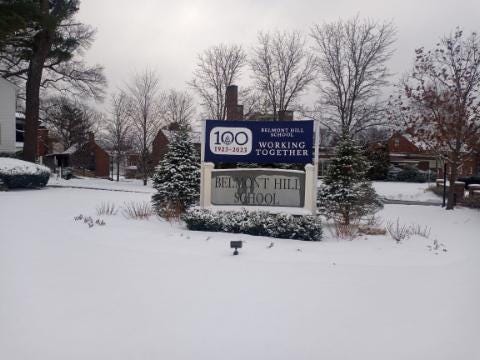01.18.2023
MassGOP chair’s bizarro reelection pitch | Home prices headed down in 2023 | Paving over paradise | Struggling students, sluggish bureaucrats | About Contrarian Boston |
News tips? Story ideas? Email us at sbvanvoorhis@hotmail.com
There goes the neighborhood: Elite private school’s stealth expansion roils Belmont
Talk about leading with the wrong foot.
Belmont Hill School spent years snapping up pricey single-family homes and wooded lots near its campus, apparently using straw buyers in some cases to disguise its identity.
Still, the private school, where tuition tops $65,000, remained on good terms with its neighbors, sending them boxes of chocolates once a year and granting them ice time at the rink. No one was overly concerned about the prep school’s longer-term plans, with faculty living in some of houses the school had bought.
But all that changed overnight for Belmont Hill in late 2021. That’s when the school kicked off plans for a new East Campus in the worst possible way, with an eyesore of a first phase all but designed to infuriate residents in the upscale neighborhood across the street, where a home selling for $1 million is called a fixer-upper.
The private school has proposed bulldozing seven acres of woodland to make way for a 153-space parking lot and a massive, 7,000-square-foot maintenance shed. Oh yeah, and let’s not forget the two, very large, above-ground fuel tanks that will go along with it.
Bold vision: Belmont Hill School would like to build a parking lot here. (photo by Peter Joll of Belmont Media Center)
For Tanya Austin, that means a parking lot will replace the woods behind her backyard she looks out upon each day, not something she and her husband bargained for when they moved to the neighborhood by Belmont Hill from Cambridge in 2020.
“Little things like ice time and a box of chocolates against big things like paving the woods to build a parking lot - it’s hard to square that,” Austin said. “Basically, they need to put their money where their mouth is and show us they want to be a good neighbor.”
Neighbors have organized an effective counter campaign, focusing attention on the wild turkeys, foxes, coyotes and other critters that would be given the boot by Belmont Hill’s expansion and getting hundreds of town residents to sign a petition opposing the expansion.
But whether the message is getting through to the leaders of a school whose graduates include billionaire financier Thomas H. Lee, the late, legendary Boston Globe editor Thomas Winship, and influential Boston developer Ron Druker - not to mention a long list of Olympic athletes, ambassadors and other luminaries - remains to be seen.
While Belmont Hill has made some minor concessions, it still appears to be hoping to a get green light from the town for its stunningly ham-handed plan.
A spokesperson for the school seems a nice enough fellow. Apparently unhurried as Contrarian Boston’s deadline approached, he pledged in an email to “get back to you when I have a chance.”
Thanks Bill!
Still, can you really blame him? We suspect school officials, in the rarified world of the Belmont Hill campus, just naturally expect deference.
But the thing is, the world is not so deferential - or forgiving - when you step off campus.
And when you propose clear cutting your neighbors’ woods and erecting what is effectively a fuel depot/gas station for maintenance trucks, people are going to call you out for it.
Will town officials in Belmont push back and demand some changes? Who knows.
Belmont Hill likely has a trump card here in the 72-year-old Dover Amendment, which gives extraordinary leeway to religious and nonprofit institutions when it comes to dealing with local zoning rules, Lois Pines, a respected former state senator from Newton who now lives in Belmont, told CB,
“Their proposal has really aggravated a great many people,” Pines said. “They claim since they are an educational institution they can do anything they like.”
That said, the prep school has spent who knows how many millions buying up the neighborhood across from its campus, house by house and lot by lot.
And if things do go south for its expansion plans, the whole experience could prove to be a very expensive lesson for Belmont Hill in the rough and tumble politics of real estate development.
Straight out of Crazytown: Fighting for reelection, Trumpie MassGOP chair plans to sue party moderates for “damages”
Jim Jones Lyons has more than earned his nickname as he’s led the state Republican Party to the edge of extinction.
Now Lyons, as he makes his reelection pitch to party activists across the state, is pitching some sort of bizarre, class-action-style lawsuit.
The target? Other MassGOP leaders, from what’s left of the party’s moderate, Charlie Baker wing, which Lyons claims “took our money and wasted it.”
Now that’s rich, to say the least. The geriatric former state lawmaker from Andover blew tens of thousands of dollars to probe Gov. Maura Healey’s sex life and then stiffed the opposition research firm that did the work.
No matter. Lyons is now circulating a letter to Republican town committee members.
Jim Jones Lyons back when he was a state rep.
The ask? Sign onto a lawsuit against unnamed state party opponents he contends are behind a “concerted (conspiratorial) agreement” to sabotage the workings of the MassGOP under his leadership.
Lyons’ beef? Well, among other things, state party treasurer Patrick Crowley last year cut off the MassGOP chair’s access to the party’s bank account, saying a majority of state Republican party committee members would first have to approve a budget, per the organization’s bylaws.
Lyons is also apparently mad at all the bad press he is getting, or what MassGOP chair calls an “unlawful concerted effort to publish false, defamatory accounts by using methods of general circulation.”
“Everyone in this room is entitled to damages,” Lyons told a group of MassGOP committee members the other night, per a clip posted on Twitter. “I am going to fight like hell and get you what you deserve.”
Yep, a good, old-fashioned Stalinist purge. Just what the nearly extinct state Republican party needs right now.
Good luck with that.
Tipping point for Massachusetts home prices?
Could be. The median price of a home in Massachusetts rose 2 percent in December, hitting $510,000, according to The Warren Group, publisher of Banker & Tradesman.
On the face of it, that wouldn’t seem like cause for either concern or celebration, depending on your perspective. Yet it’s part of a larger pattern that has seen the margin of home price increases steadily shrink over the past few months as sales have tumbled.
So here’s a not so bold prediction: At some point in 2023, and maybe not that far off, we will start to see home prices in Massachusetts move into negative territory.
Whether we see substantial declines, though, all hinges on what happens with the economy and if a recession hits.
Stay tuned.
Urgency please: Student Post Covid Learning Recovery Can’t Be Optional
If and when Commissioner Jeff Riley and the Department of Early and Secondary Education (DESE) get around to prescribing strategies for Massachusetts schools to close pandemic-caused learning gaps, their recommendations should not be optional, according to a paper released by Annenberg Brown University.
Especially if equity is a priority.
According to the report, recovery programs for schools cannot be optional, or “opt-in” for the students with identified needs, and those students and their parents must be engaged with ongoing communication from school administrators and teachers to ensure participation and engagement with academic recovery strategies.
Following a pattern that defers to school officials over student needs, DESE may choose to leave too many choices up to schools to sidestep potentially contentious politics, but the report says that would be a mistake.
The report includes information from several studies of the issues and highlights the fact that ample money such as the $2 billion Massachusetts has waiting in the wings doesn’t guarantee anything.
“Billions of dollars are invested in opt-in, educational resources to accelerate students’ learning. Although advertised to support struggling, marginalized students, there is no guarantee these students will opt in…and struggling students were far less likely to opt in than their more engaged and higher achieving peers,” says the report.
DESE has said that in the case of Massachusetts, historically lower performing schools are not necessarily our worst performers, and that may be so, but if equity is our priority, then it’s likely a good idea to give poorer performing schools a bit more attention. The Annenberg paper observes that “Ample research shows that these students were more likely have lower prior achievement and come from lower income families and marginalized groups.”
Public conversation about what DESE proposes for actionable strategies to overcome learning loss are sparse, despite the best efforts of the Board of Education to steer DESE in the right direction.
If DESE needs some hints about what kind of recovery programs schools should be targeting, the paper outlines some of the most effective approaches to regain grade level mastery as quickly as possible.
Unlimited, personalized and on demand tutoring tops the list. Tutoring is “…one of the most promising approaches for accelerating student learning and reducing educational disparities,” according to the report, siting over 100 randomized controlled trials that have assessed the effectiveness of this approach. Of note, research also shows tutoring has greater effectiveness than reducing class sizes or teacher professional development programs.”
These are exactly the sort of solutions the Board of Education has been encouraging DESE to implement. Thus far, DESE has publicly shown no interest in taking the board’s counsel, and the board is legally powerless to improve DESE’s listening skills.
But there’s more to a successful recovery than academics. As the available billions of dollars do get allocated, the report suggests that simply putting recovery programs in place will be insufficient. Regular, frequent communications with both parents and students are required to improve participation in available programs.
“Communications to parents and students together increase the likelihood students access tutoring by 46%,” the report finds.
Schools should be naturally good at this. Maybe they are. Maybe they aren’t. Consequently, DESE should make sure that each school’s plans to communicate are up to snuff and state officials should make sure that recovery money is earmarked to support a solid communication effort to give schools what they need to get the job done.
The Board of Education meets with DESE officials again on January 23 and 24, and presumably the agenda will continue to include discussion about Covid 19 related learning recovery plans.
All of us, especially parents, should demand decisions be made soon on demonstrated and proven program strategies like on-demand, personalized tutoring.
That is if we want our students to get the help they need and deserve before time and money are frittered away.
David Mancuso is a veteran communication, public affairs, business strategist and founder of Mancuso Communication Strategies.
What is Contrarian Boston?
I have fielded emails over the past couple weeks asking what Contrarian Boston is about.
Here’s a link to our mission statement – you can find it in the “about” section.
For a more prosaic, nuts-and-bolts description, read on.
An online newsletter, Contrarian Boston publishes every Tuesday, Thursday and Saturday. In Contrarian Boston you’ll find analysis of the day’s news, and original reporting as well.
Our focus is:
· Politics and all levels of governance, good and bad, with an emphasis on state and local, with some national mixed in;
· Economic growth and business, especially real estate, housing and new development projects;
· The media and why it does what it does;
· Education, from school board spats to the doings of multibillion-dollar university endowments;
· And whatever else catches our fancy.






